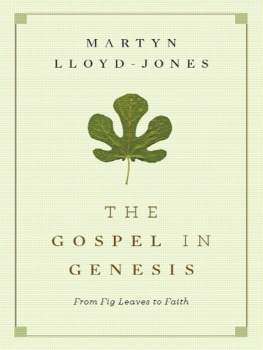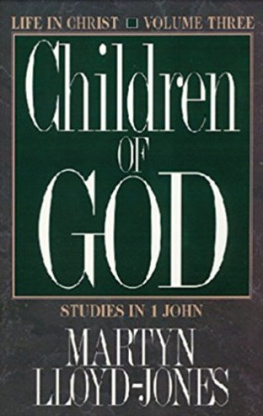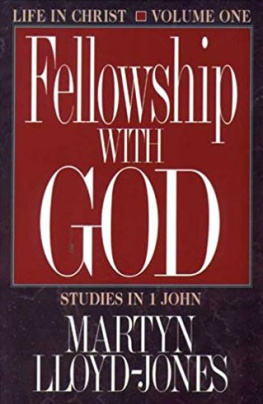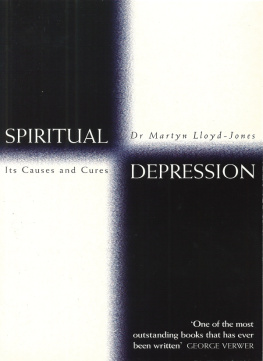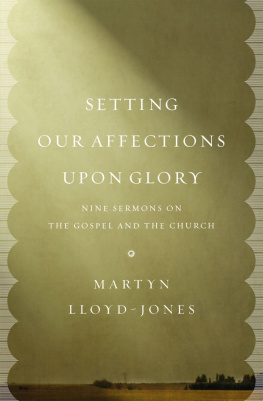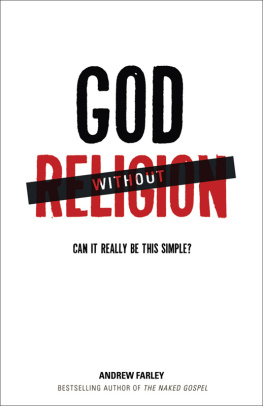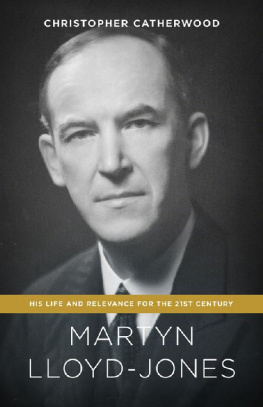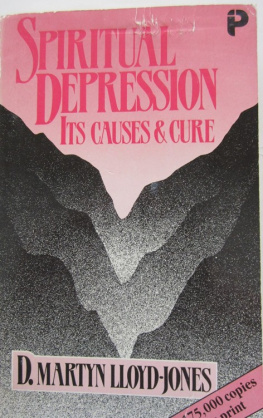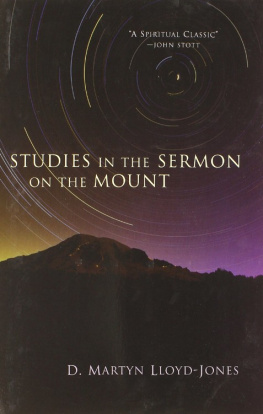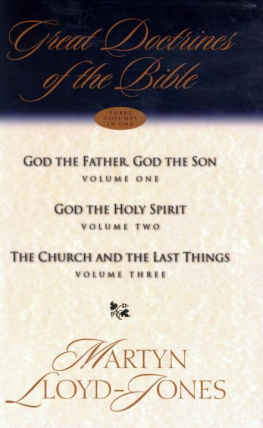LET NOT YOUR
HEART BE TROUBLED

Let Not Your Heart Be Troubled
Copyright 2009 by Elizabeth Catherwood and Ann Beatt
Originally published as Be Still My Soul: Resting in the Greatness of God and His Love for You, copyright 1995; published by Servant Publications.
Published by Crossway Books
a publishing ministry of Good News Publishers
1300 Crescent Street
Wheaton, Illinois 60187
All rights reserved. No part of this publication may be reproduced, stored in a retrieval system or transmitted in any form by any means, electronic, mechanical, photocopy, recording or otherwise, without the prior permission of the publisher, except as provided for by USA copyright law.
Cover design: Cindy Kiple
Cover photo: Getty Images
First printing, 2009
Printed in the United States of America
All Scripture quotations are taken from the King James Version of the Bible.
Tradepaperback ISBN: 978-1-4335-0119-7
PDF ISBN: 978-1-4335-1245-2
Mobipocket ISBN: 978-1-4335-1246-9
Library of Congress Cataloging-in-Publication Data
Lloyd-Jones, David Martyn.
(Be still my soul)
Let not your heart be troubled / Martyn Lloyd-Jones; foreword
by Elizabeth Catherwood and Ann Beatt.
p. cm.
Originally published: Be still my soul. Ann Arbor, Mich.: Vine
Books, c1995.
Includes bibliographical references.
ISBN 978-1-4335-0119-7 (tpb)
1. Trust in GodChristianitySermons. 2. Peace of mindReligious
aspectsChristianitySermons. 3. Sermons, English. I. Title.
BV4637.L55 2009
252'.058dc22
2009000678
VP 18 17 16 15 14 13 12 11 10 09
14 13 12 11 10 9 8 7 6 5 4 3 2 1
CONTENTS
Our father, Martyn Lloyd-Jones (18991981), preached these sermons in 1951 in Westminster Chapel in London. These were difficult times for the people of Britain, indeed for all the Western world. The Second World War was not long over, and many economic, political, national, and personal problems were left in its wake. But there was also the menace of the Cold War, with the nuclear threat that hung over both sides. There was not the same euphoria as there had been after the First World War; people were anxious and fearful.
So it was in this atmosphere that our father preached this short series of sermons. They were intended to comfort, strengthen, and build up Christians in their most holy faith (Jude 20) and to bring unbelievers to a knowledge of the only way in which men and women can face matters of life and death. He sought to show that these familiar words were not only relevant in funerals but could be applied to all facets of our lives, and the way in which he handled these words was characteristic of his ministry. He did not use them as a kind of soothing refrain that would lull our fears to rest. Rather, he went through them carefully, showing that the way to deal with our fears was first to confront them and recognize them and then to realize that the answer to them was only to be found in the great and unchanging truths of the Christian gospel.
So he shows what these truths are: belief in God, belief in Jesus Christ and his work, the certainty of his promise that he will take us safely to his Fathers house, and so on. These are foundational doctrines, but he does not deal with them clinically. Throughout we are reminded of the love that brought it all to pass.
He once described preaching as logic on fire, and this is evident in these sermons. They are perhaps briefer in their exposition than, for example, his later great series on Romans and Ephesians, but the truths and the spirit are the same.
Toward the end of his life, when he was very weak, he experienced for himself these things that he had preached earlier. One evening his doctor said to him, I dont like to see you weary and worn and sad like this.
No, came back the whispered answer, not sad! He pointed those of us in the family to the great verses in 2 Corinthians 4:1618:
For which cause we faint not; but though our outward man perish, yet the inward man is renewed day by day. For our light affliction, which is but for a moment, worketh for us a far more exceeding and eternal weight of glory; while we look not at the things which are seen, but at the things which are not seen: for the things which are seen are temporal; but the things which are not seen are eternal.
He also asked us not to pray for healing. Dont try to hold me back from the glory, he said. He was ill for many months, but the great truths of John 14 held him fast. He knew that the Savior whom he had served so faithfully for so many years had prepared a place for him. He knew the quiet heart, the stillness of the soul, of which these sermons speak.
Elizabeth Catherwood
Ann Beatt
September 9, 1994

Let not your heart be troubled:
ye believe in God, believe also in me.
JOHN 14:1

LET NOT YOUR HEART
BE TROUBLED
Let not your heart be troubled: ye believe in God, believe also in me.
JOHN 14:1
As we come to consider this great passage together, I think most commentators agree that a better way of translating it is, Let not your heart be troubled, believe in God, believe also in me. In other words, it is probably right to say that it is the imperative that we have in both cases.
However, these words are probably familiar to most of us; indeed they are perhaps some of the most familiar and tender words ever uttered by our Lord and Savior Jesus Christ. They are words, therefore, that we often tend to take without really facing them and their true meaning and without analyzing them as we should. It is to me a tragedy that so often we rob ourselves of the actual message of some of the most glorious statements in Scripture simply because we regard them as literature. We are content with some general effect or influence that they may produce upon us instead of taking the trouble to arrive at their exact meaning and their precise import.
Now that, I think, is very true of these words, words that may be most familiar to us in funerals. They are words of comfort and consolation, which we tend, therefore, to think of far too often as some kind of beautiful music or some wonderful diction. So we never get any further, almost feeling at times that it is a sacrilege to analyze something that is so beautiful.
Let not your heart be troubled: ye believe in God, believe also in me. In my Fathers house are many mansions: if it were not so, I would have told you. I go to prepare a place for you. And if I go and prepare a place for you, I will come again, and receive you unto myself; that where I am, there ye may be also.... Peace I leave with you, my peace I give unto you.... Let not your heart be troubled, neither let it be afraid. (John 14:13, 27)
We have heard those words many times, but I wonder what would happen if we suddenly had to sit down with paper in front of us and face a question such as, state the doctrine contained in those familiar wordswhat exactly do they say? Have these words, I wonder, come to us merely in that general manner, that kind of general consolation, that can be done equally well by beautiful music or by any beautiful thoughts or passages of literature? Or have we derived comfort and consolation from them because we have realized the doctrine that they are announcing?
Our Lords whole purpose in uttering these words was that he might instruct his disciples and help them by bringing them to a deeper knowledge and understanding of truth. He was addressing their minds primarily, and the way in which he came to do so is of significance and importance. He had just been telling these men, who had now accompanied him for about three years, that he was about to leave them. He was still young, in his early thirties, and to their astonishment and utter chagrin he announced that he was going to leave them. Now, he said, is the Son of man glorified, and God is glorified in him.... Little children, yet a little while I am with you. Ye shall seek me: and as I said unto the Jews, Whither I go, ye cannot come; so now I say to you (John 13:31, 33). But he realized at once that this information had upset these disciples and had made them unhappy and disconsolate. Their hearts had become troubled, they were ill at ease, and they had lost their peace because they were suddenly confronted by a problem.
Next page

